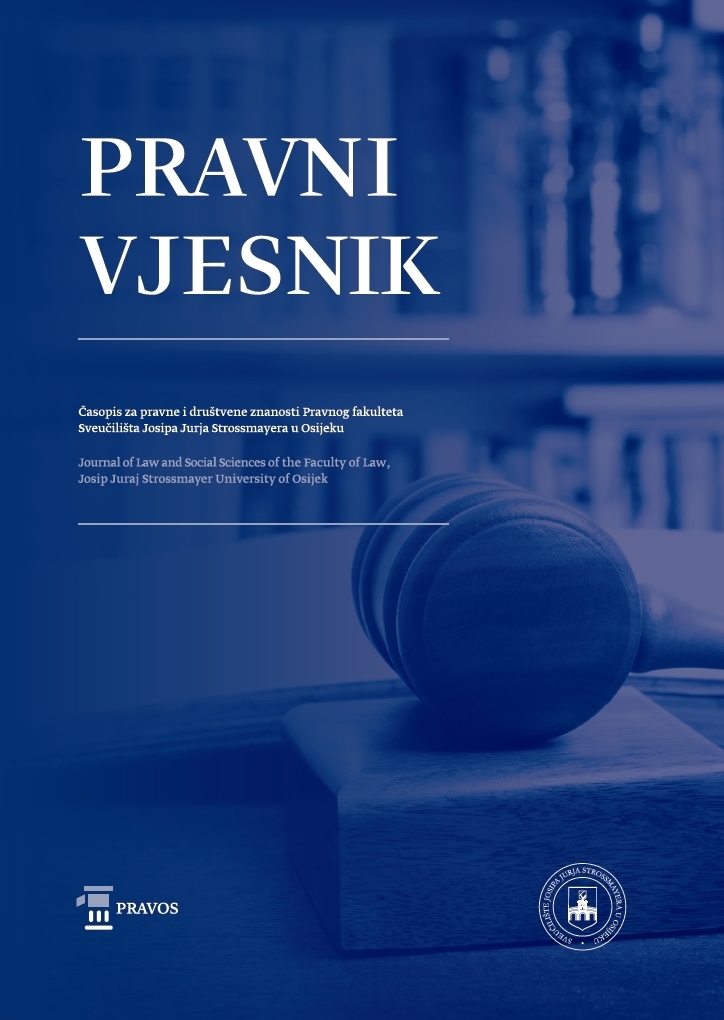DEFENDANT’S CONFESSION AT THE MAIN HEARING IN CROATIAN AND COMPARATIVE LAW: JUST ANOTHER PIECE OF EVIDENCE, GUILTY PLEA OR A TACIT AGREEMENT?
DOI:
https://doi.org/10.25234/pv/13874Keywords:
confession, guilty plea, main hearing, consensual justice, criminal procedureAbstract
The effects of a defendant’s confession are not the same in all legal orders. In civil law systems, confession is usually perceived as an ordinary piece of evidence, while in common law culture it is considered a guilty plea whose truthfulness is not to be questioned by the judge. However, this broad differentiation is not straightforward. In Croatia, if a defendant confesses to a criminal offence punishable by a fine or imprisonment of up to five years at the main hearing and agrees to the sentence proposed by the prosecutor, the trial court is not allowed to impose a sentence higher than the one proposed by the prosecutor. This can motivate tacit agreements and unregulated negotiations between the parties after the main hearing has already begun, and it is unclear if the legislator had such a scenario in mind when enacting this provision. In order to elucidate these problems in a broader perspective, the authors have analysed Croatian, German, Austrian, French, Italian and English law, with an emphasis on the position of the defendant after a confession at the main hearing, the effects of the confession, the role of the court in further proceedings and the victim’s rights. After the comparative analysis, the authors presented their opinion on the current legal situation in Croatia, especially Art. 417a (6) and (7) of the Code of Criminal Procedure, together with a proposal for legislative changes.
References
Coscas-Williams, B., Alberstain, M.: A Patchwork of doors: accelerated proceedings in continental criminal justice systems, New Criminal Law Review, vol. 22, No. 4, fall 2019, pp. 585-617
Dervieux, V.,The French system, in European Criminal Procedures, (eds. Delmas-Marty, M., Spencer, J.R.) Cambridge University Press, 2006, pp. 218-292.
Đurđević, Rekonstrukcija, judicijalizacija, konstitucionalizacija, europeizacija hrvatskog kaznenog postupka V. novelom ZKP/08: prvi dio?, HLJKPP, No 2, 2013, pp. 335-342.
Frommann, M., Regulating Plea-bargaining in Germany: Can the Italian Approach Serve as a Model to Guarantee the Independence of German Judges?, Comparative law, Hanse Law Review, vol. 5, No, 1, pp. 197-220
Gierhake, K., Zur Begründung des Öffentlichkeitsgrundsatzes im Strafverfahren, JuristenZeitung No. 21, November 2013, pp. 1000-1038.
Hodgson, J., Guilty Pleas and the Changing Role of the Prosecutor in French Criminal Justice, Warwick School of Law Research Paper, No. 2010/15, pp. 398-426
Kirchbacher in Fuchs, H., Ratz, E. (eds.), Wiener Kommentar zur Strafprozessordnung, 88. Ed., MANZ, 2009
Krapac, D. i suradnici, Kazneno procesno pravo, Prva knjiga institucije, Narodne novine, Zagreb, 2015
Krstulović, A., Nagodbe stranaka u suvremenom kaznenom postupku, Hrvatsko udruženje za kaznene znanosti i praksu-MUP RH, Zagreb, 2007
Krehl, Karlsruher Kommentar/StPO zur Strafprozessordnung: StPO mit GVG, EGGVG und EMRK, C.H. BECK, 8. Aufl., 2019
Ljubanović, V., Novokmet, A., Tomičić, Z., Kazneno procesno pravo – izabrana poglavlja, PRAVOS, Osijek, 2019
McPeake, R., Criminal Litigation and Sentencing, Oxford, 23the Edition, 2011
Ormedor, D, Perry, D. (eds.), Blackstone's Criminal Practice 2018, Oxfords University Press, UK, 2018
Perrodet, A., The Italian System, in Delmas-Marty, M., Spencer, J.R. (eds.) European Criminal Procedures, Cambridge University Press, Cambridge, 2006, pp. 348-415.
Richard Nobles & David Schiff, The Supervision of Guilty Pleas by the Court of Appeal of England and Wales – Workable Relationships and Tragic Choices, Criminal Law Forum, volume 31, 2020, p. 513–552.
Ruggeri, S., Audi Alteram Partem in Criminal Proceedings, Towards a Participatory Understanding of Criminal Justice in Europe and Latin America, Springer, 2017
Ruggieri, F., Marcolini, S., Italy in Ligeti, K. (ed.) Toward a Prosecutor for European Union, volume: 1: A comparative Analysis, London: Hart Publishing, 2013, pp. 368-403.
Soubise, L., Guilty Pleas in an Inquisitorial Setting – an Empirical Study of France (September 2018). Journal of Law and Society, Cardiff University Law School, Vol. 45, Issue 3, 2018, pp.
Specer, J. R., Evidence, in European Criminal Procedures (eds. Delmas_marty, M., Spencer, J.R.), Cambridge University Press, Cambridge2006, pp. 594-641.
Tomašević, G., Kazneno procesno pravo, Opći dio: Temeljni pojmovi, Pravni fakultet Sveučilišta u Splitu, Split, 2011
Tricot, J., France in Toward a Prosecutor for the European Union, A comparative Analysis (ed. Katalin Ligeti), London: Hart Publishing, vol. 1, 2013, pp. 222-263
LIST OF REGULATIONS AND ACTS
Strafprozeßordnung (StPO) as published on 7 April 1987 (Official Gazette I, p. 1074, 1319), last amended by Article 49 of the Act from 21 December 2020 (Official Gazette I, p. 3096)
Strafprozessordnung (StPO) 1975, BGBl. Nr. 631/1975 (WV), latest amendment BGBl. I Nr. 24/2020
Code de procédure pénale Code de procedure penale, Version en vigueur au 08 décembre 2020, https://www.legifrance.gouv.fr/codes/texte_lc/LEGITEXT000006071154/ Accessed 13 January 2021.
Codice di procedura penale, Aggiornato al D.L. 17 marzo 2020, n. 18. https://www.altalex.com/documents/codici-altalex/2014/10/30/codice-di-procedura-penale. Accessed 13 January 2021.
Croatian Code of Criminal Procedure (C-CCP), Official Gazette (Narodne novine), no. 152/08, 76/09, 80/11, 91/12 – Decision and Ruling of the Constitutional Court of the Republic of Croatia, 143/12, 56/13, 145/13, 152/14, 70/17, and 126/19
Downloads
Published
Issue
Section
License
Copyright (c) 2021 Igor Martinović, Ivana Radić

This work is licensed under a Creative Commons Attribution-NonCommercial 4.0 International License.
Authors retain the copyright on the papers published in the Journal, but grant the right of first publication to the Journal. Papers accepted for publication or already published in Pravni vjesnik of the Faculty of Law in Osijek may be published by the author(s) in other publications only with proper notice of its previous publication in Pravni vjesnik.






